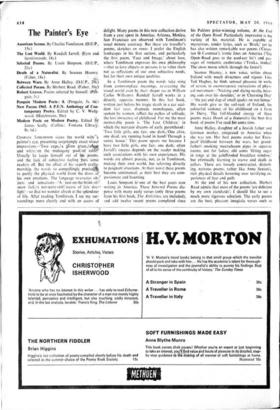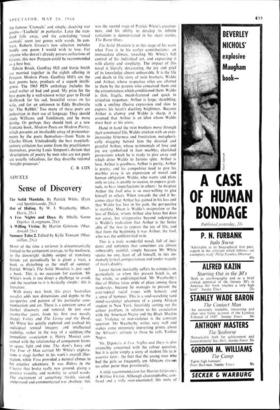The Painter's Eye -
guin, 5s.) temporary Poetry. Edited. by C. V. Wedg- wood. (Hutchinson, 30s.)
CHARLES TomuNsoN views the world withIka painter's eye, presenting surprisingly exact visual impressions—`Two cups,/ a even grace,/aflat and white/on the mahogany pool/ of tab?P." Usually he keeps himself out of his poems, and the lack of subjective feeling 'flits some readers off. But the effect of his superb craf manship, the words so compellingly precise. to purify the physical world from the dross of his own emotions. The language re-creates ob-?t jects and sensations—Vs just-on-the-brink-of snow feel,/a not-quite-real/access of late day=e light'—so that we wonder afresh at the splendour of life. After reading Tomlinson, I see my sur- roundings more clearly and with an access of delight. Many poems in this new collection derive from a year spent in America; Arizona, Mexico, San Francisco are observed with Tomlinson's usual minute accuracy. But ,these are traveller's poems, sketches en route. I prefer the English landscapes in his first section, and particularly the first poem, 'Face and Image,' about love, where Tomlinson expresses his own philosophy —that to love objects or persons is to value them not as reflections of our own subjective needs, but for their own unique qualities.
In a Tomlinson poem the words take wing from commonplace meanings, re-creating the visual world even by their shapes (as in William Carlos Williams). Randall Jarrell works in a directly opposite manner. In this last book, written just before his tragic death in a car acci- dent last year, dramatic monologues, often spoken by women, reflect the pathos of solitude, the lost innocence of childhood. For me the most memorable poem is 'The Lost Children,' in which the narrator dreams of early parenthood: 'Two little girls, one fair, one dark,/One alive, one dead, are running hand in hand/Through a sunny house.' This poem upsets me because I have two little girls, one fair, one dark; often Jarrell's success depends on the reader making such associations. with his own experiences: His words are almost prosaic, not, as in Tomlinson, making their own world, but referring directly to poignant situations. At their worst these poems become sentimental; at their best- they are com- passionate and haunting.
Louis Simpson -is'one of the best poets now writing in America. These Selected Poems dis- pense with many early verses (only three poems from his first book, The Arrivistes, are included), and add twelve recent poems completed since his Pulitzer prize-winning volume, At the End of the Open Road. Particularly impressive is the variety of his material. He is capable of mysterious, tender lyrics, such as 'Birch,' yet he has also written remarkable war poems (`Caren- tan 0 .Carentan'), ironic lines on America (`The Open-Road goes to the used-car lot') and pas- sages of romantic exuberance- (`Troika, troika! The snow moon whirls through the forest').
Seamus Heaney, a new voice, writes about Ireland with much directness and vigour. Like Ted Hughes, he finds sensual pleasure in verbs of action, in onomatopoeic recreations of physi- cal movement—Nicking and slicing neatly, heav- ing sods over his shoulder,' or in 'Churning Day' =the pat and slap of small spades on wet lumps.' His words give us the soil-reek of Ireland, the colourful violence of his childhood on a farm in Derry. The full-blooded energy of these poems make Death of a Naturalist the best first book of poems I've read for some time.
Anne Halley, daughter of a Jewish father and German mother, emigrated to America when she was ten. Her best poems evoke her Euro- pearrthildhood between the wars, her grand- fathees' smoking meerschaum pipes in separate rooms, not for ladies; old aunts 'lifting sugar in tongs at the goldflooded breakfast window,' but dintually learning to starve and skulk in cellars. These are loosely constructed, disturb- ing, nervous poems, rather like Anne Sexton's, rich physical details hovering over terrifying ex- periences of fear and guilt.
At the end of his new collection, Herbert Read admits that most of the poems 'are deficient by my own standards'; I should like to see a much more rigorous selection. The early poems are the best, pleasant imagistic verses such as
the famous `Cranach,' and simple, shocking war poems—Tiedholz' in particular. Later the stan- dard falls away, and the concluding ' `vocal avowals' seem just games with words. In. con- trast, Roberts Graves's new selection includes hardly one poem 1 would wish to lose. For anyone who doesn't already possess collections of Graves, this new Penguin could be recommended as a best buy.
Edwin Brock, Geoffrey Hill and Stevie Smith are married together in the eighth offering in Penguin Modern Poets. Geoffrey Hill's are the best poems here, products of a superb intelli- gence. The 1965 PEN anthology includes the usual welter of bad and good. My prize for the best poem by a well-known writer goes to David Holbrook for his sad, beautiful verses on his wife, and for an unknown to Eddy Brathwaite for. 'The Rabbit.' Too many of these poets are pedestrian in their use of language. They should study Williams and Tomlinson, and be more daring. Or perhaps they should look at a new Fontana book, Modern Poets on Modern Poetry, which presents an invaluable array of pronounce- ments by the poets themselves—from Yeats to Charles Olson. Undoubtedly the best twentieth- century criticism has come from the practitioners themselves, proving Louis Simpson's dictum that 'descriptions of poetry by men who are not poets are usually ridiculous, for they describe rational thought-processes.'
C. B. COX



































 Previous page
Previous page